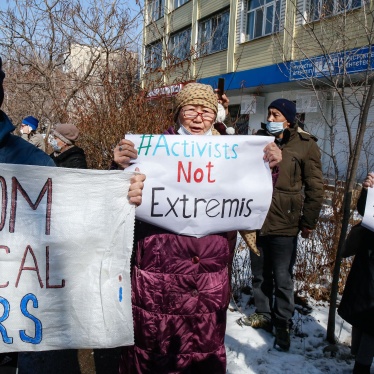As one would expect from so eloquent a leader, Barack Obama has brought a marked improvement in presidential rhetoric on human rights compared with his predecessor. In a series of speeches around the world, carefully tailored for each audience, the president has set forth a compelling vision, stressing that respect for human rights is not only the right thing to do but also broadly beneficial for society. The challenge facing his administration is translating that rhetoric into policy and practice.
In Cairo, for example, Obama stressed the importance of democracy. Unlike George W. Bush, who stopped promoting democracy in the Middle East once Hamas won elections in the Palestinian territories and the Muslim Brotherhood did better than expected in Egypt, Obama suggested that he would accept the results of fair elections no matter how they came out. But disappointingly, Obama has done little visibly to push Middle Eastern autocrats allied with the U.S., such as Egypt's Hosni Mubarak and the Saudi royal family, in a more democratic direction.
In Africa, Bill Clinton had lionized such "new African leaders" as Paul Kagame of Rwanda and Meles Zenawi of Ethiopia, each of whom has now turned in a more authoritarian direction. Speaking in Accra, Obama implicitly repudiated that approach by saying that Africa doesn't need "strong men" but "strong institutions," such as honest police forces and independent media. Yet that insight has not yielded sustained pressure on either man to reverse course.
The Russian government has sought to impede critical human rights reporting by imposing burdensome regulatory requirements. Obama responded in a Moscow speech by stressing the importance of civil society. Yet he has not put serious pressure on Russia to bring to justice those unidentified assailants behind the epidemic of murders of activists and journalists working on human rights issues.
Obama touched the right points about the importance of respecting human rights in China, but he undermined the message by failing to meet beforehand with the Dalai Lama. Secretary of State Hillary Clinton did not help when she said earlier that human rights "can't interfere" with other U.S. interests in China. Predictably, Obama got little if anything in human rights terms from his China visit.
Even on counterterrorism — the area where Obama's actions have moved the farthest from Bush's — the results are less than had been hoped. Obama ordered the CIA to abide by the military's far better rules for interrogation, and he shut the secret detention facilities where torture occurred, but he has refused to investigate, let alone prosecute, those who ordered torture or provided thin legal justifications for it. Obama said he would close Guatanamo, but it turns out he may have meant only the physical facility, not what it symbolizes; he proposes to continue trying some suspects in military commissions that remain substandard, albeit slightly improved from Bush's, and he refuses to rule out long-term detention without trial.
Obama recognizes the importance of redeeming America's reputation on human rights after the dark Bush years. But it'll take more than impressive rhetoric to succeed. Words must be followed by actions.








